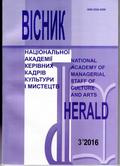GERMANY – UKRAINE: SOCIO-CULTURAL APPROACH
TO THE ENVIRONMENTAL PUBLIC ADVERTISING
GERMANY – UKRAINE: SOCIO-CULTURAL APPROACH
TO THE ENVIRONMENTAL PUBLIC ADVERTISING
Author(s): Olena Novikova, Svitlana Valeriyivna PryshchenkoSubject(s): Visual Arts, Cultural Anthropology / Ethnology, Theory of Communication, Political Ecology, Sociology of Culture
Published by: Національна академія керівних кадрів культури і мистецтв
Keywords: eco-poster; environmental public advertising; visual means; advertising graphics; imagery
Summary/Abstract: Purpose of the research. The article studies the imagery and stylistic trends of environmental public advertising, includ-ing in the structure of Media space Germany and Ukraine. The activation of attention to the problems of contemporary environ-mental protection and rational use of natural resources greatly will facilitate the eco-culture development of society, especially the younger generation. Methodology of the research is the used of socio-cultural approach to study the interaction of verbal and visual components of eco-poster. Scientific originality of the research is to advanced study the social appeal as a combined ver-bal-visual model, the language of which is based on stylistic devices and means of Postmodern culture. Original artistic images, nonstandard interpretations, humor and satire are needed in today's eco-posters, and so it becomes more important to use crea-tive technologies in the creation of social appeal – metaphor, metonymy, allegory, association, hyperbole. It is noted that the main purpose Triennial "4th Block, Chernobyl" in Kharkov, which organized the Ukrainian Аssociation of graphic designers – to attract the global attention to environmental problems and the effects after social, technogenic and natural disasters. Comparative analy-sis was revealed that the German environmental poster are interesting and imaginative, because the environmental issues have been a lot more attention in the society, and in accordance with the eco-topic theme are cultivated and distributed in the Media. Conclusions. This materials are part of the workshops "Public advertising" in Munich Ludwig-Maximilian University. In view of the shift to the visual component in advertising appeal, we are considers practicable for further development of the integrated course, which can be used not only for designers, but advertisers, culturologists, sociologists, sociocultural activities managers also.
Journal: Вісник Національної академії керівних кадрів культури і мистецтв
- Issue Year: 2016
- Issue No: 3
- Page Range: 57-61
- Page Count: 5
- Language: English

